How Pedro Albizu Campos
Got a Bad Deal
(September 12, 1891 – April 21, 1965)
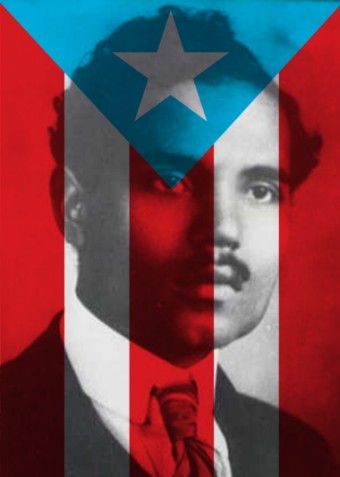 Pedro Albizu
Campos was
a Puerto Rican attorney and politician, and the leading figure in the Puerto
Rican independence movement. Gifted in languages, he spoke six; graduating from
Harvard Law School with the highest grade point average in his law class, an
achievement that earned him the right to give the valedictorian speech at his
graduation ceremony.
Pedro Albizu
Campos was
a Puerto Rican attorney and politician, and the leading figure in the Puerto
Rican independence movement. Gifted in languages, he spoke six; graduating from
Harvard Law School with the highest grade point average in his law class, an
achievement that earned him the right to give the valedictorian speech at his
graduation ceremony.
However, hostility towards his mixed racial heritage would lead to his professors
delaying two of his final exams in order to keep him from graduating
on time. During his time at Harvard University he became involved in the Irish
struggle for independence.
Albizu Campos was the president and spokesperson of the Puerto Rican Nationalist
Party from 1930 until his death in 1965. Because of his oratorical skill, he was
hailed as El Maestro (The Teacher). He was imprisoned twenty-six years for
attempting to overthrow the United States government in Puerto Rico. In 1950, he
planned and called for armed uprisings in several cities in Puerto Rico on
behalf of independence. Afterward he was convicted and imprisoned again. He died
in 1965 shortly after his pardon and release from federal prison, some time
after suffering a stroke. There is controversy over his medical treatment in
prison.
He was born in a sector of Barrio Machuelo Abajo in Ponce, Puerto Rico to Juana
Campos, a domestic worker of Spanish, African and Taíno ancestry, on 12th.
of
September of 1891. His father, Alejandro Albizu Romero, known as "El Vizcaíno," was
a Basque merchant, from a family of Spanish immigrants who had temporarily
resided in Venezuela. From an educated family, Albizu was the nephew of the
danza composer Juan Morel Campos, and cousin of Puerto Rican educator Dr. Carlos
Albizu Miranda. The boy's mother died when he was young and his father did not
acknowledge him until he was at Harvard University.
Albizu graduated from Ponce High School, a "public school for the
city's white elite." In 1912, Albizu was awarded a scholarship to study
Engineering, specializing in Chemistry, at the University of Vermont. In 1913,
he transferred to Harvard University so as to continue his studies.
At the outbreak of World War I, he volunteered in the United States Infantry.
Albizu was commissioned a Second Lieutenant in the Army Reserves and sent to the
City of Ponce, where he organized the town's Home Guard. He was called to serve
in the regular Army and sent to Camp Las Casas for further training. Upon
completing the training, he was assigned to the 375th Infantry Regiment. The
United States Army, then segregated, assigned Puerto Ricans of recognizably
African descent as soldiers to the all-black units, such as the 375th Regiment.
Officers were men classified as white, as was Albizu Campos.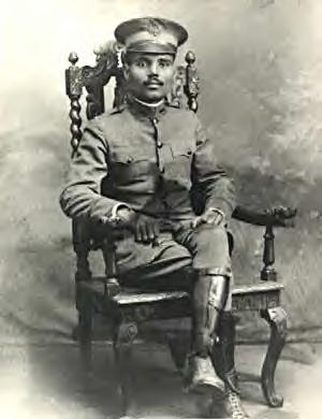
Lieutenant Pedro Albizu Campos was honorably discharged from the Army in 1919,
with the rank of First Lieutenant. However, his exposure to racism during his
time in the U.S. military altered his perspective on U.S.- Puerto Rico
relations, and he became the leading advocate for Puerto Rican independence.
Albizu graduated from Harvard Law School in 1921 while simultaneously studying
Literature, Philosophy, Chemical Engineering, and Military Science at Harvard
College. He was fluent in six modern and two classical languages: English,
Spanish, French, German, Portuguese, Italian, Latin, and ancient Greek.
Upon
graduation from law school, he was recruited for prestigious
positions, including a law clerkship to the U.S. Supreme Court, a diplomatic
post with the U.S. State Department, the regional vice-presidency (Caribbean
region) of a U.S. agricultural syndicate, and a tenured faculty appointment to
the University of Puerto Rico.
So What Happened?
— The Bad Deal —
On June 23, 1921, after graduating from Harvard Law School, he returned to
Puerto Rico—but without his law diploma. He had been the victim of racial
discrimination by one of his professors, who delayed Albizu Campos' third-year
final exams for courses in Evidence and Corporations. He was about to
graduate with the highest grade-point average in his entire law school class. As
such, he was scheduled to give the valedictory speech during the graduation
ceremonies. His professor delayed his exams so that he could not complete his
work, and avoided the "embarrassment" of a Puerto Rican law valedictorian.
Nationalist activists wanted independence from foreign banks, absentee
plantation owners, and United States colonial rule. Accordingly, they started
organizing in Puerto Rico. In 1919, José Coll y Cuchí, a member of the Union
Party of Puerto Rico, took followers with him to form the Nationalist
Association of Puerto Rico in San Juan, to work for independence. They gained
legislative approval to repatriate the remains of Ramón Emeterio Betances, the
Puerto Rican patriot, from Paris, France.
In 1932, Albizu published a letter accusing Dr. Cornelius P. Rhoads, an American
pathologist with the Rockefeller Institute, of killing Puerto Rican patients in
San Juan's Presbyterian Hospital, as part of his medical research. Albizu Campos
had been given an unmailed letter by Rhoads addressed to a colleague, found
after Rhoads returned to the United States.
Part of what Rhoads wrote, in a letter to his friend which began by complaining
about another's job appointment, included the following:
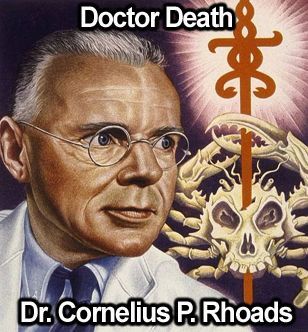 "I can get a damn fine job here and
am tempted to take it. It would be ideal except for the
Puerto Ricans. They are beyond doubt the dirtiest,
laziest, most degenerate and thievish race of men ever
inhabiting this sphere. It makes you sick to inhabit the
same island with them.
"I can get a damn fine job here and
am tempted to take it. It would be ideal except for the
Puerto Ricans. They are beyond doubt the dirtiest,
laziest, most degenerate and thievish race of men ever
inhabiting this sphere. It makes you sick to inhabit the
same island with them.
They are even lower than
Italians. What the island needs is not public health
work but a tidal wave or something to totally
exterminate the population. It might then be livable.
I have done my best to further the process of
extermination by killing off 8 and transplanting cancer
into several more. The latter has not resulted in any
fatalities so far...
The matter of consideration for the
patients' welfare plays no role here - in fact all
physicians take delight in the abuse and torture of the
unfortunate subjects."
Albizu sent copies of the letter to the League of Nations, the Pan American
Union, the American Civil Liberties Union, newspapers, embassies, and the
Vatican. He also sent copies of the Rhoads letter to the media, and
published his own letter in the Porto Rico Progress. He used it as an
opportunity to attack United States imperialism, writing:
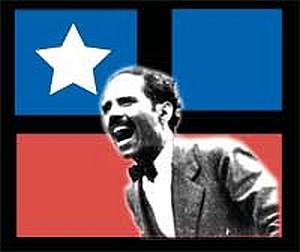 "The mercantile monopoly is backed by the financial monopoly... The United
States have mortgaged the country to their own financial interests. The military
intervention destroyed agriculture. It changed the country into a huge sugar
plantation..."
"The mercantile monopoly is backed by the financial monopoly... The United
States have mortgaged the country to their own financial interests. The military
intervention destroyed agriculture. It changed the country into a huge sugar
plantation..."
Albizu Campos accused Rhoads and the United States of trying to
exterminate the native population, saying, "Evidently, submissive people coming
under the North American empire, under the shadow of its flag, are taken ill and
die.
The facts confirm absolutely a system of extermination." He went on, "It
(the Rockefeller Foundation) has in fact been working out a plan to exterminate
our people by inoculating patients unfortunate enough to go to them with virus
of incurable diseases such as cancer."
After these events, on April 3, 1936, a federal grand jury submitted an
indictment against Albizu Campos, Juan Antonio Corretjer, Luis F. Velázquez,
Clemente Soto Vélez and the following members of the cadets: Erasmo Velázquez,
Julio H. Velázquez, Rafael Ortiz Pacheco, Juan Gallardo Santiago, and Pablo
Rosado Ortiz. They were charged with sedition and other violations of Title 18
of the United States Code.
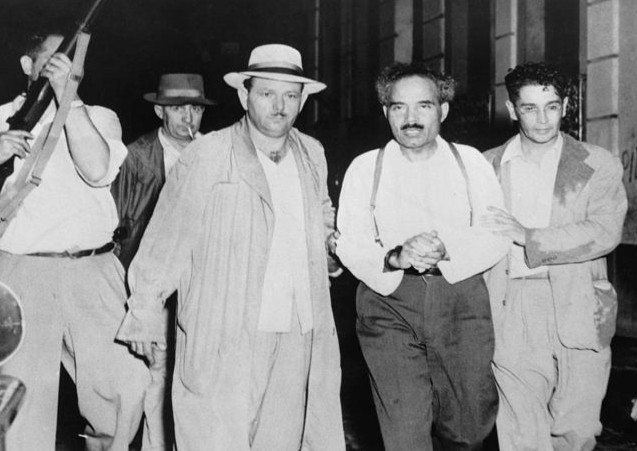
Lolita Lebrón called him "Puerto Rico's most visionary leader"
and nationalists consider him "one of the island's greatest patriots of the 20th
century." Juan Manuel Carrión
wrote that "Albizu still represents a forceful challenge to the very fabric of
Puerto Rico's colonial political order."
His followers state that Albizu's
political and military actions served as a primer for positive change in Puerto
Rico, including the improvement of labor conditions for peasants and workers, a
more accurate assessment of the colonial relationship between Puerto Rico and
the United States, and an awareness by the political establishment in
Washington, D.C. of this colonial relationship.
Supporters state that the legacy is that of an exemplary sacrifice for the
building of the Puerto Rican nation...a legacy of resistance to colonial rule. His critics say that he "failed to attract and offer concrete
solutions to the struggling poor and working class people and thus was unable to
spread the revolution to the masses."
The revival of public observance of the Grito de Lares and its significant icons
was a result of Albizu Campos's efforts as the leader of the Puerto Rican
Nationalist Party.
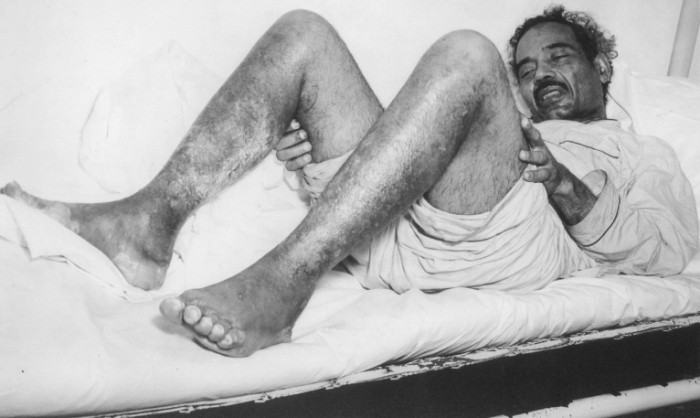
During his imprisonment, Albizu suffered deteriorating health. He alleged that
he was the subject of human radiation experiments in prison and said that he
could see colored rays bombarding him. When he wrapped wet towels around his
head in order to shield himself from the radiation, the prison guards ridiculed
him as El Rey de las Toallas (The King of the Towels).
Officials suggested that Pedro Albizu Campos was suffering from mental illness,
but other prisoners at La Princesa prison including Francisco Matos Paoli,
Roberto Díaz and Juan Jaca, claimed that they felt the effects of radiation on
their own bodies as well.
Dr. Orlando Daumy, a radiologist and president of the Cuban Cancer Association,
traveled to Puerto Rico to examine him. From his direct physical examination of
Albizu Campos, Dr. Daumy reached three specific conclusions:
1) that the sores on Albizu Campos were
produced by radiation burns
2) that his symptoms corresponded to those of a person
who had received intense radiation,
3) that wrapping himself in wet towels was the best way
to diminish the intensity of the rays.
In 1956, Albizu suffered a stroke in prison and was transferred to San Juan's
Presbyterian Hospital under police guard.
On November 15, 1964, on the brink of death, Pedro Albizu Campos was pardoned by
Governor Luis Muñoz Marín. He died on April 21, 1965. More than 75,000 Puerto
Ricans were part of a procession that accompanied his body for burial in the Old
San Juan Cemetery.
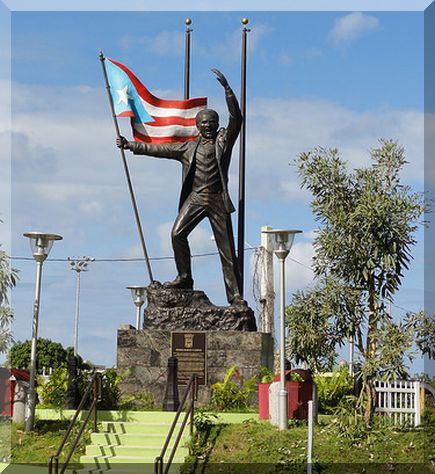
Statue of Don Pedro Albizu Campos in Mayaguez


donjibaro@gmail.com

“Live in such a way that no one blames the rest of us
nor finds fault with our work.” —(2 Corinthians 6:3)

Jibaros.Com®,
Jibaros.Net® - ALL content is Copyright © by Orlando Vázquez,
owner-designer and com does not accept any responsibility for the
privacy policy of third party sites